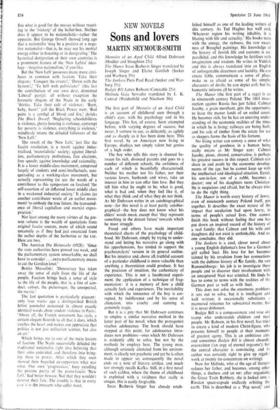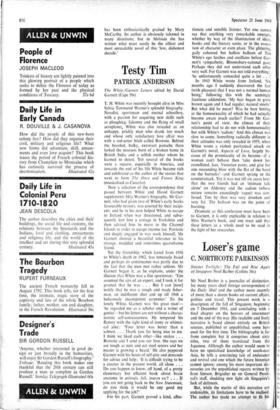NEW NOVELS
Sons and lovers
MARTIN SEYMOUR-SMITH
Memoirs of an Aged Child Alfred Duhrssen (Hodder and Stoughton 25s) The Manor Isaac Bashevis Singer translated by Joseph Singer and Elaine Gottlieb (Seeker and Warburg 35s) The Junkers Piers Paul Read (Seeker and War- burg 35s) Budgie Bill James Robson (Constable 25s) Melinda Gaia Servadio translated by L. K. Conrad (Weidenfeld and Nicolson 30s) The first part of Memoirs of an Aged Child is an account of childhood seen through a child's eyes, with his psychology and in his language. This has, of course, been attempted before, with varying degrees of success; but never, I venture to say, as delicately, as agilely and as sharply as it has been done here. This first novel, by an American now living in Europe, displays not simply talent but genius of a high order.
The boy who tells this story is shunted be- tween his rich, divorced parents and goes to a number of different schools, the awfulness of each of which is beautifully characterised. Neither his mother nor his father, nor their various lovers, husbands and wives, take an interest in him or can offer him love. But they tell him what he ought to be, what is good, what is bad and, when they feel like it, of what they think and of what they do not think. As Mr Duhrssen writes in an autobiographical note—for this novel is at least partly autobio- graphical—the boy does not know what his elders' words mean, except that 'they represent something in the distant future' towards which he must struggle.
Freud and others have made important theoretical charts of the psychology of child- hood. Mr Duhrssen, simply by trying to under- stand and letting his narrative go along with his apprehensions, has tended to support the psychoanalysts' version in its general outline. But his intuitive and, above all, truthful account of a particular childhood is more valuable than anything a theoretician could produce. It has the precision of intuition, the authenticity of experience. This is not a lucubrated experi- ment, the application of a technique of frag- mentation : it is a memory of how a child actually feels and experiences. The inevitability with which the innocence of the boy is cor- rupted, by indifference and by his sense of alienation, into cruelty and cunning is genuinely tragic.
But it is a pity that Mr Duhrssen continues to employ a similar narrative method in the latter part of his novel, when the protagonist reaches adolescence. The book should have stopped at this point, for adolescence intro- duces new problems—ones which Mr Duhrssen is evidently able to solve, but not by the methods he employs here. The young man, although seriously alienated from his environ- ment, is clearly not psychotic and yet he is often made to appear so; consequently the novel ends on a note of literary. artifice, and much too strongly recalls Kafka. Still, in a first novel of such calibre, where the theme of childhood is exploited with a vividness that really is unique, this is easily forgivable.
Isaac Bashevis Singer has already estab- lished himself as one of the leading writers of this century. As Ted Hughes has well said, `Whatever region his writing inhabits, it is blazing with life and actuality.' His books teem with the energy, the richness, the raw exact- ness of Breughel paintings. His knowledge of the history of Jewish life and customs is un- paralleled, and this knowledge he fertilises with imagination and wisdom. He writes in Yiddish and this is always translated into an English of unforgettable directness and lucidity. He can create fable, communicate a sense of place, make us as afraid as some of his simpler characters of devils; he can depict evil; but his humanity informs all he writes.
The Manor (the first part of a saga) is set in nineteenth century Poland. The 1863 insur- rection against Russia has just failed. Calman Jacoby, a grain merchant, gets the opportunity to lease the manor lands of an exiled count.
He becomes rich, for he has an unerring under- standing of the economic realities of the time, in which be is living; railways are being built. and his sale of timber from the estate for use as sleepers forms the basis of his fortune. No living writer can convey a sense of what the quality of goodness in a human being really means as Mr Singer can: Calman Jacoby, pious, shrewd, conservative, is perhaps his greatest success in this respect. Calman can share in and profit by the economic develop- ments of the age, but he cannot keep up with the intellectual and ideological situation. Ezriel. his son-in-law, son of a rabbi, becomes a doctor; one of his daughters turns Christian. He is suspicious and afraid, but he always tries to do the right thing. The Manor is worth every history of Jewry. even of nineteenth century Poland itself, put together. It describes the exact nature of the impact that secularism had upon Jewry, in terms of people's actual lives. One cannot finish this book without feeling that one has put down an inspired record of the history of a real family; that Calman and his wife and daughters did not exist is unthinkable. And so, one concludes, they did.
The Junkers is a cool, clever novel about a young English diplomat's love for a German girl called Suzi. His love for her becomes tainted by his revulsion from her connections with the dubious history of Tier family, the von Rummelsburgs: his job is to investigate these people and to discover their involvement with an uncaptured Nazi war criminal. He finds he has to come to terms with the realities of the German past as well as with Suzi. This does not solve the enormous problem, it sets out to solve, but it is intelligent and dell written; it occasionally substitutes a mannered reticence for substantial matter, but it is never dishonest.
Budgie Bill is a compassionate and wise old tramp who understands children and mad people. Mr Robson, in his first novel, has tried to create a kind of modern Christ-figure, who presents himself to people at their moments of greatest agony. This is an ambitious aim. and sometimes Budgie Bill is almost absurdly overwritten ('an orgy of eternal orgasms'); but the central character is convincing, and its author was certainly right to give up regular work at twenty (to concentrate on writing). Now for Melinda, who at the age of thirteen seduces her father, and becomes, among other things, a duchess and an mt.; after organising the Great Train Robbery, she is locked into a Russian space-capsule endlessly orbiting the earth. This is described as a 'Pop novel,' and
has been enthusiastically praised by Mary McCarthy. Its author is obviously talented in many directions; but in Melinda she has written what must surely be the silliest and most unreadable novel of this low, dishonest decade.'







































 Previous page
Previous page